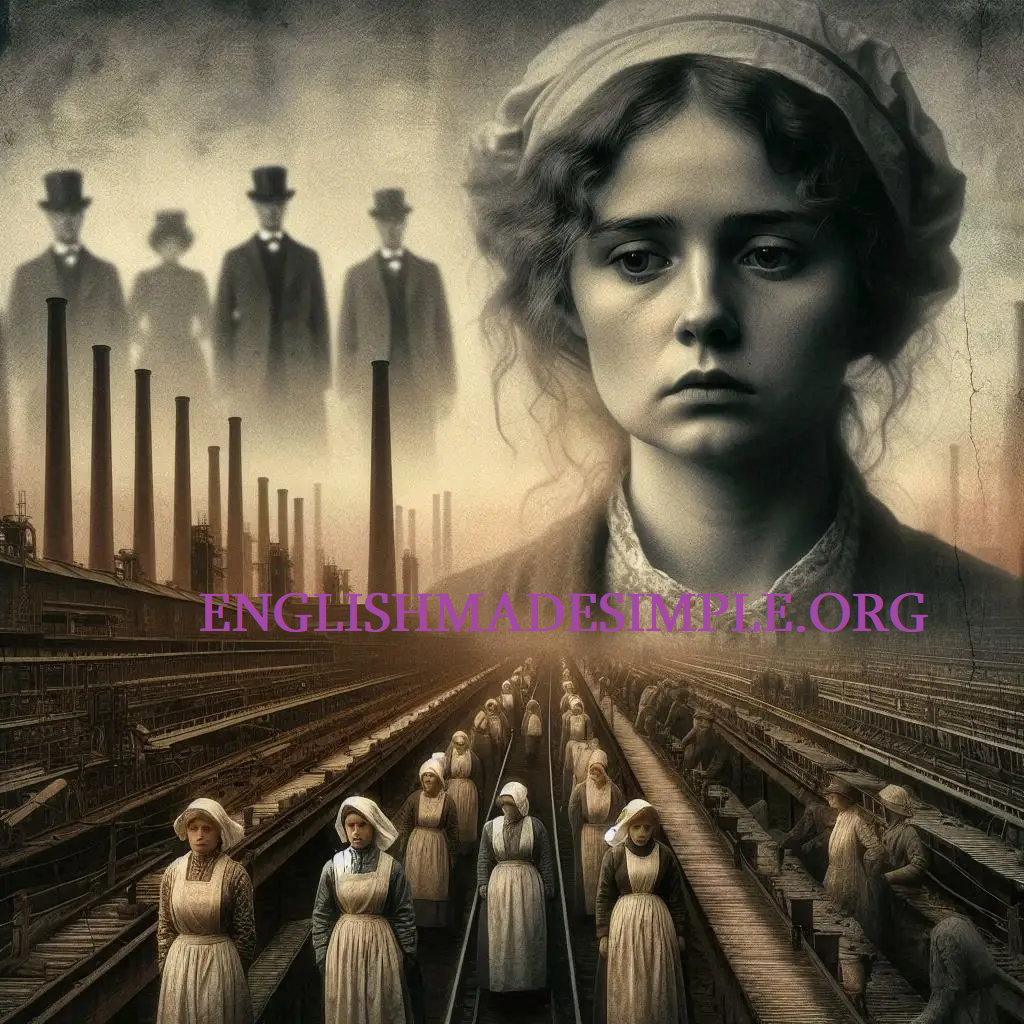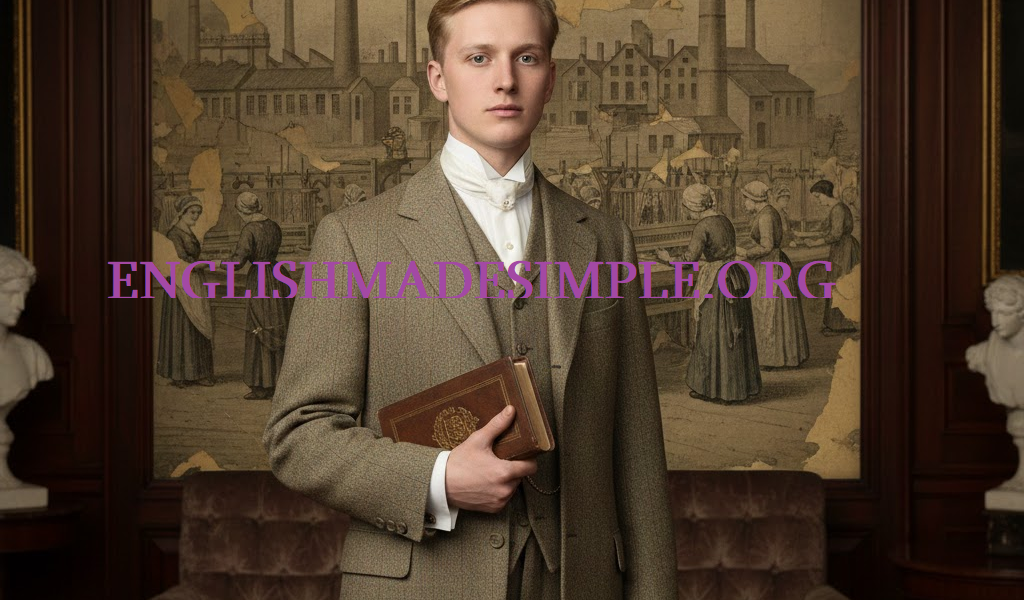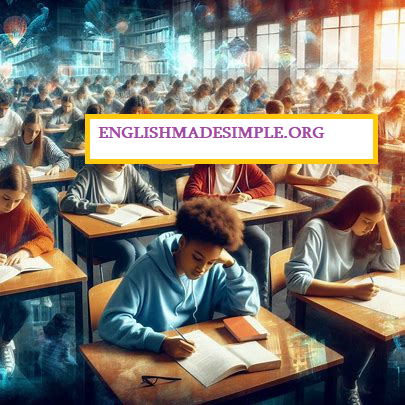Below is a full GCSE-style package: sample AQA-style exam questions, Grade-9 model answers, and a breakdown of themes, context, vocabulary and techniques that make high-level responses.
To read our list of quotes from Eric Birling, click on this link. >>> https://englishmadesimple.org/eric-birling-quotes/
✅ Sample AQA-Style GCSE Exam Questions
All based on Eric Birling and the quote:
“I don’t know – really. Suddenly I felt I just had to laugh.”
Section A: Character / Extract-Based Questions
-
How does Priestley present Eric as a morally irresponsible young man at this point in the play?
Refer to the quote and elsewhere in the play. -
How does Priestley use the character of Eric to explore the theme of guilt?
Use the extract containing the quote and the play as a whole. -
How does Priestley show the conflict between the generations through Eric’s behaviour and attitudes?
Refer to the quote and the whole play. -
Starting with this moment, how does Priestley present Eric as a character who changes over the course of the play?
-
How does Priestley use Eric’s reaction (“I just had to laugh”) to highlight the social inequalities at the time?
Write about the extract and the whole play.
Section B: Theme-Based Questions
-
How does Priestley present the consequences of a capitalist society through Eric?
-
How far is Eric responsible for Eva Smith’s death?
Use the quote and the play as a whole. -
How does Priestley make Eric’s guilt dramatically significant?
Refer to the quote and elsewhere in the play.
⭐ GRADE 9 MODEL ANSWERS
Below are two full Grade-9 style responses written in the tone, depth, and sophistication expected from top-level scripts.
Model Answer 1: “How does Priestley present Eric as a morally irresponsible young man at this point in the play?”
In this moment, Priestley uses Eric’s unsettled and inappropriate laughter to emphasise his moral irresponsibility and emotional immaturity. The fragmented admission, “I don’t know – really. Suddenly I felt I just had to laugh,” exposes a character who lacks control over both his impulses and his emotions. The hesitating punctuation suggests confusion, almost as if Eric is trying to excuse his behaviour, while the word “suddenly” implies spontaneity rather than thoughtfulness. Priestley uses this to present Eric as a product of his privileged upbringing—untouched by consequence, and therefore careless.
Elsewhere in the play, Eric’s irresponsibility becomes more destructive and morally serious. His heavy drinking and violent behaviour towards Eva Smith show a darker aspect of this loss of self-control. The same impulsiveness hinted at in his awkward laughter here escalates into behaviour that ruins another person’s life. Priestley deliberately aligns Eric’s lack of restraint with the broader irresponsibility of the upper classes: he is a microcosm of a generation raised in complacency and without accountability.
However, Priestley complicates this idea by allowing Eric to grow. Although he begins the play irresponsible and childish, he ends it deeply self-aware and genuinely remorseful. This development ultimately reinforces Priestley’s socialist message: young people, unlike the older generation, are capable of acknowledging their faults and changing their behaviour. Eric’s initial irresponsibility therefore becomes dramatically useful—it highlights the transformation that Priestley wants his audience to believe in.
Model Answer 2: “How does Priestley present Eric as a character who changes over the course of the play?”
Priestley introduces Eric as an uneasy and unpredictable presence, and this moment—where he claims “I just had to laugh”—captures the lack of confidence and control that shapes his early behaviour. His disjointed speech, with its pauses and half-explanations, suggests a young man who cannot articulate his feelings or understand his own actions. Priestley portrays him as someone trapped by social expectations, using nervous laughter to mask the guilt and shame he has not yet been forced to confront.
As the Inspector’s investigation progresses, Eric’s facade collapses. His confession about drinking, stealing, and exploiting Eva Smith reveals the depth of his moral failure—yet it also marks the beginning of genuine change. Priestley allows him to express clear remorse, using emotionally charged language such as “the fact remains that I did what I did” to show how fully he accepts responsibility. This self-awareness contrasts sharply with the defensiveness of Mr and Mrs Birling, creating a generational divide that Priestley uses to promote socialist ideas.
By the end of the play, Eric becomes a symbol of hope. He is horrified when his parents celebrate the possibility that the Inspector was not real, insisting, “It doesn’t make any difference.” His transformation from immature boy to morally awakened young man reinforces Priestley’s message that society can improve only if the younger generation embraces responsibility, empathy, and change. Eric’s development is therefore not only personal but ideological, serving Priestley’s larger purpose of inspiring social reform.
🔍 Themes Relevant to the Quote
1. Responsibility
Eric’s unstable behaviour suggests an early inability to accept responsibility; his change later highlights Priestley’s belief that responsibility must be collective.
2. Guilt
His laughter masks an internal guilt that he does not yet have the emotional maturity to confront.
3. Generational Conflict
Eric embodies the younger generation—capable of learning, changing, and rejecting their parents’ rigid, capitalist values.
4. Social Inequality
Eric benefits from privilege, and his careless behaviour contrasts with the harsh consequences faced by Eva Smith.
5. Masculinity and Power
His lack of self-control foreshadows how power and entitlement lead to his exploitation of Eva.
🕰️ Historical Background (for top-level context references)
-
1912 Setting: Society rigidly divided; upper-class men had unchecked social and economic power.
-
Post-1945 Audience: Priestley writes after World War II, appealing to a nation ready for change.
-
Socialism vs Capitalism: The Inspector represents socialist ideals—responsibility and collective duty—while the Birlings represent complacent capitalism.
-
Gender Expectations: Women like Eva had little protection; Eric’s behaviour exposes the hypocrisy of Edwardian morality.

✍️ High-Level Vocabulary Useful in Grade 9 Answers
-
microcosm
-
facade
-
moral reckoning
-
dramatic irony
-
symbolic
-
socially conditioned
-
ideological conflict
-
destabilised
-
collective responsibility
-
transformation arc
🎭 Grade 9 Language Techniques Used in the Model Answers (Explained)
1. Close Analysis of Language
Explaining:
-
pauses
-
dashes
-
fragmented syntax
-
emotional tone
This shows detailed engagement with the quotation.
2. Linking Extract → Whole Play
A Grade 9 response always moves beyond the single quote, discussing later developments and contrasts.
3. Context Woven Subtly
Context is not bolted on. It explains why Priestley writes Eric this way.
4. Writer’s Purpose
Every point connects back to Priestley’s intention:
to promote socialism, expose inequality, critique capitalism, encourage responsibility.
5. Interpretations
Top answers offer multiple readings:
-
Eric as weak
-
Eric as guilty
-
Eric as capable of change
6. Terminology of Drama
Words like dramatically significant, audience, effect, performance elevate the answer.
📘 Eric Birling — Revision Sheet (GCSE English Literature)
1. Who is Eric? (Overview)
-
Son of Arthur and Sybil Birling.
-
Early 20s, insecure, awkward, heavy drinker.
-
Represents the younger generation and Priestley’s message of hope and change.
-
Begins irresponsible, but becomes the most remorseful of all the characters.
2. Key Traits & What They Show
✔ Immature and Nervous
-
Quote: “I don’t know – really. Suddenly I felt I just had to laugh.”
→ Shows emotional instability, social awkwardness, and immaturity.
✔ Irresponsible
-
Heavy drinking hinted early: “not quite at ease”, “squiffy”.
-
His actions with Eva are reckless and harmful.
✔ Exploitative / Abuses Power
-
Eric drinks too much, forces himself on Eva, gives her stolen money.
-
Represents the dangers of unearned male privilege in 1912 society.
✔ Guilty
-
He admits: “the fact remains that I did what I did.”
→ Shows acceptance of blame—contrasts with his parents.
✔ Capable of Change
-
Unlike the Birlings, he learns from the Inspector:
“It’s what happened to the girl and what we all did to her that matters.”
✔ Socially Aware (By the End)
-
Rejects his parents’ attitude:
“You’re beginning to pretend now that nothing’s really happened.”
→ Priestley uses Eric to advocate for a more responsible, empathetic future generation.
3. Eric’s Character Arc (Start → End)
| Stage | What Happens | What It Reveals |
|---|---|---|
| Beginning | Nervous laughter, awkward speech, drinking | Immaturity and lack of control |
| Middle | Confession about Eva; stealing money | His moral failure and guilt |
| Climax | Deep remorse; cries out against parents | He is capable of responsibility |
| Ending | Rejects the older generation’s denial | Shows Priestley’s message of hope |
4. Eric’s Role in Priestley’s Message
Social Responsibility
Eric comes to accept full guilt → model for the change Priestley wants.
Generational Divide
Eric and Sheila = hope
Mr & Mrs Birling = stubborn capitalism
Critique of Patriarchy
His exploitation of Eva exposes male entitlement in Edwardian society.
Capitalism’s Failings
Eric’s ability to get away with everything shows how upper-class privilege shields wrongdoing.
5. High-Value Quotations to Learn
Early Eric
-
“I don’t know – really. Suddenly I felt I just had to laugh.”
-
“Not quite at ease.”
-
“You’re squiffy.”
Middle (Confession)
-
“I was in that state when a chap easily turns nasty.”
-
“She told me she didn’t want me to go in.”
-
“I wasn’t in love with her or anything.”
End (Transformation)
-
“The fact remains that I did what I did.”
-
“You lot may be letting yourselves out nicely, but I can’t.”
-
“It doesn’t make any difference.”
These show his journey from instability → responsibility.
6. Language & Structural Points for Grade 9
Eric’s speech patterns
-
Hesitations (“I don’t know – really”)
-
Fragmented syntax
→ Reflect guilt, panic, immaturity.
Contrast with parents
-
Eric’s emotional honesty vs. their denial creates dramatic tension.
Symbolism
-
Eric symbolises the future generation who can still change society.
Foreshadowing
-
Early clues (drinking, awkwardness) hint at his later confession.
7. Key Context (AQA expects subtle use of this)
-
Set in 1912 (strict class hierarchy) → Eric was raised entitled.
-
Written in 1945 → Priestley wants post-war Britain to embrace responsibility.
-
Patriarchal society → Eva had few rights; Eric’s actions show gender inequality.
-
Rise of socialism → Eric and Sheila show the potential for social change.
8. Sample Grade 9 Summary Sentence (For Your Essays)
Eric functions as Priestley’s vehicle for hope: his transition from impulsive, privileged irresponsibility to genuine remorse embodies the social transformation Priestley believes the younger generation must embrace.


